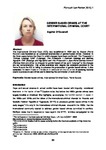Gender Based Crimes at the International Court
| dc.contributor.author | O'Connell, Sophie | |
| dc.date.accessioned | 2017-03-28T13:37:20Z | |
| dc.date.accessioned | 2017-04-11T11:15:37Z | |
| dc.date.available | 2017-03-28T13:37:20Z | |
| dc.date.available | 2017-04-11T11:15:37Z | |
| dc.date.issued | 2010 | |
| dc.identifier.citation |
O'Connell, S. (2010) 'Gender Based Crimes at the International Court', Plymouth Law and Criminal Justice Review, 3, pp. 69-80. Available at: https://pearl.plymouth.ac.uk/handle/10026.1/8960 | en_US |
| dc.identifier.issn | 2054-149X | |
| dc.identifier.uri | http://hdl.handle.net/10026.1/8960 | |
| dc.description.abstract |
The International Criminal Court (ICC) was established in 2002 and its Statute (Rome Statute1 ) was heralded as an advanced enumeration of gender based crimes. However, in the three cases before the Court in which charges have been confirmed: The Prosecutor v Thomas Lubanga Dyilo2 (Lubanga), The Prosecutor v Germain Katanga and Mathieu Ngudjolo Chii 3 (Katanga and Ngudjolo) and The Prosecutor v Jean-Pierre Bemba Gombo4 (Bemba) there are either no charges for gender based crimes as in Lubanga5 or the charges are not comprehensive. This article examines why despite the extensive provision in the Rome Statute the ICC is failing to advance the prosecution of gender based crimes. It also considers the wider impact of this failure in particular on the ICC‟s role in assisting national courts to prosecute war crimes and in deterring the commission of such crimes. | en_US |
| dc.language.iso | en | en_US |
| dc.publisher | University of Plymouth | |
| dc.rights | Attribution 4.0 International (CC BY 4.0) | * |
| dc.rights.uri | https://creativecommons.org/licenses/by/4.0/ | * |
| dc.subject | Gender based crimes | en_US |
| dc.subject | International Criminal Court | en_US |
| dc.subject | Rome Statute | en_US |
| dc.title | Gender Based Crimes at the International Court | en_US |
| dc.type | Article | en_US |
| dc.type | Article | |
| plymouth.volume | 3 | |
| plymouth.journal | The Plymouth Law & Criminal Justice Review |



